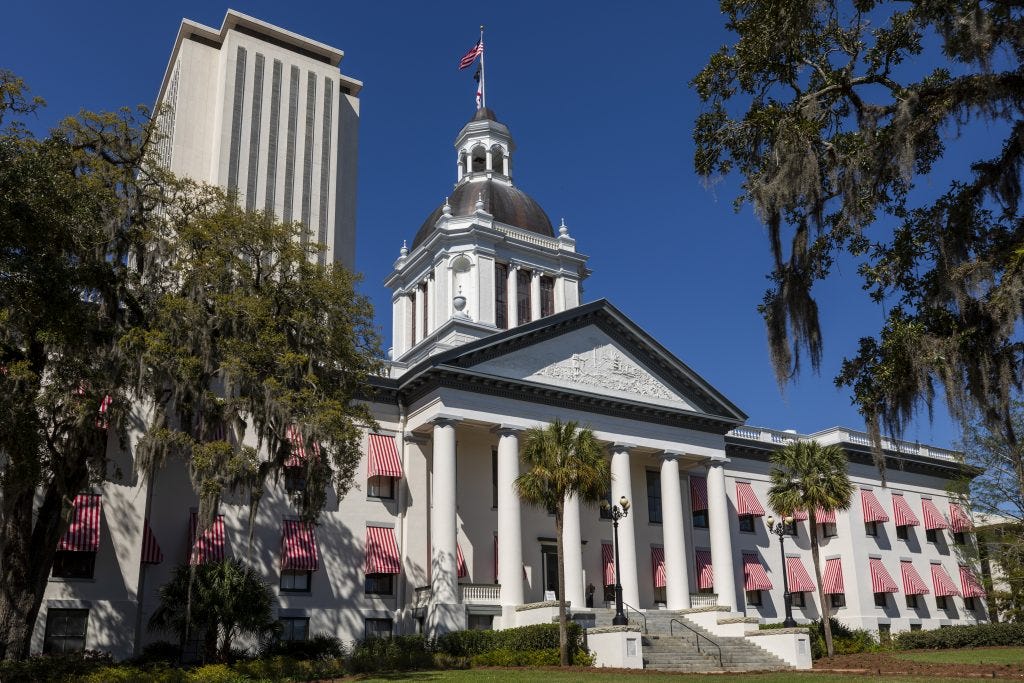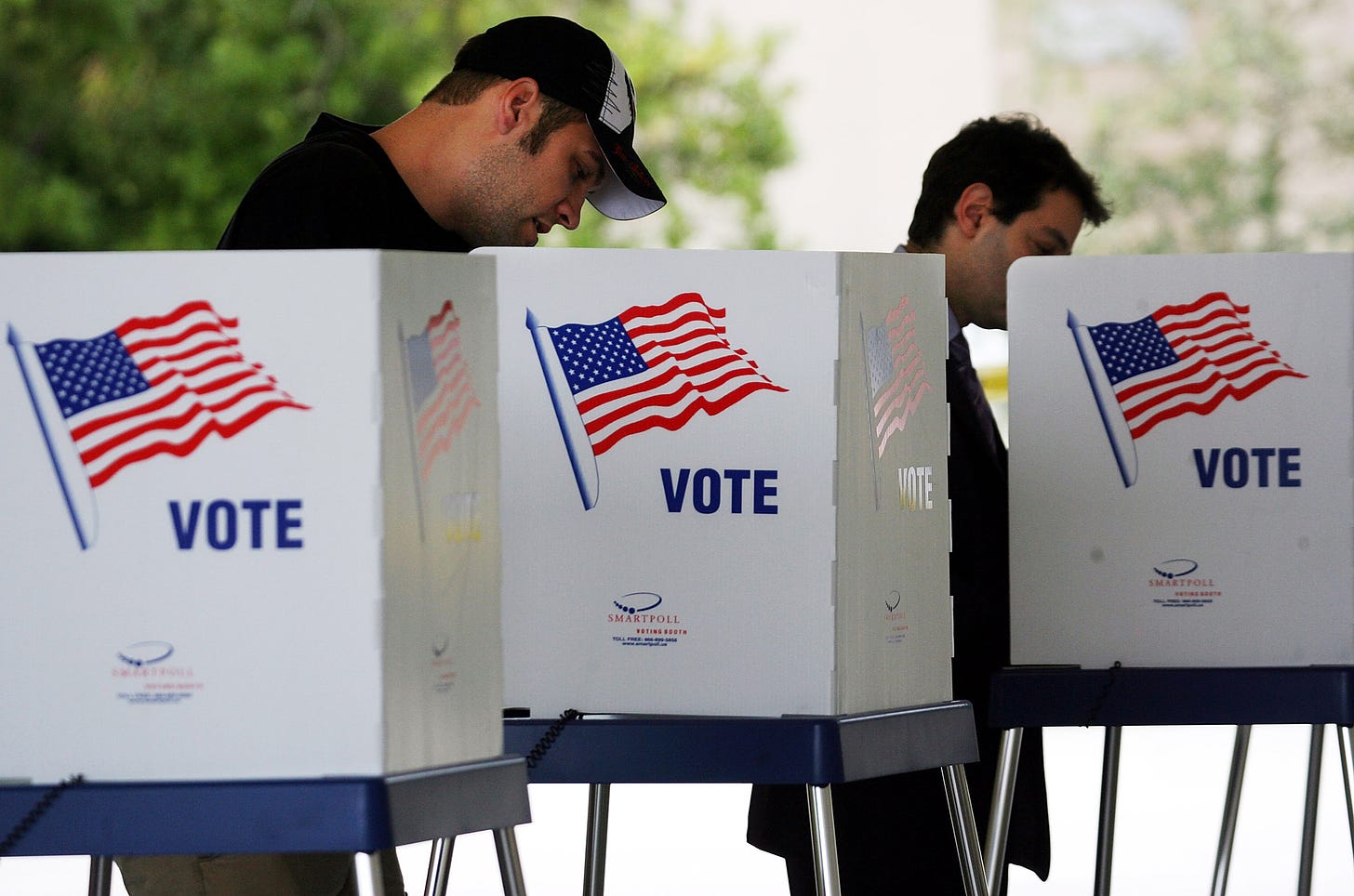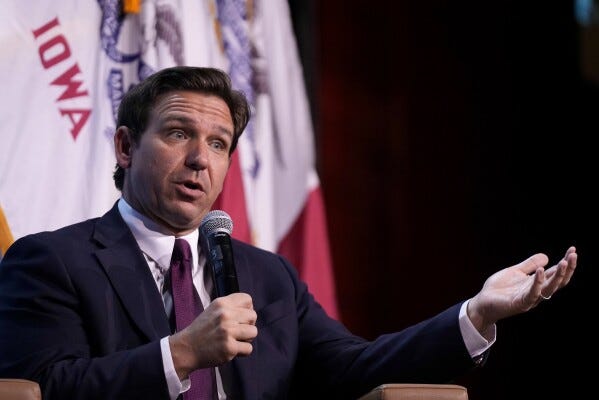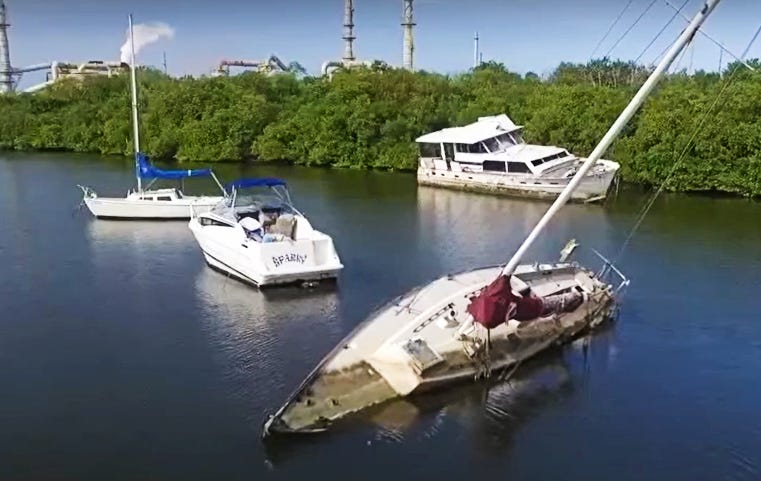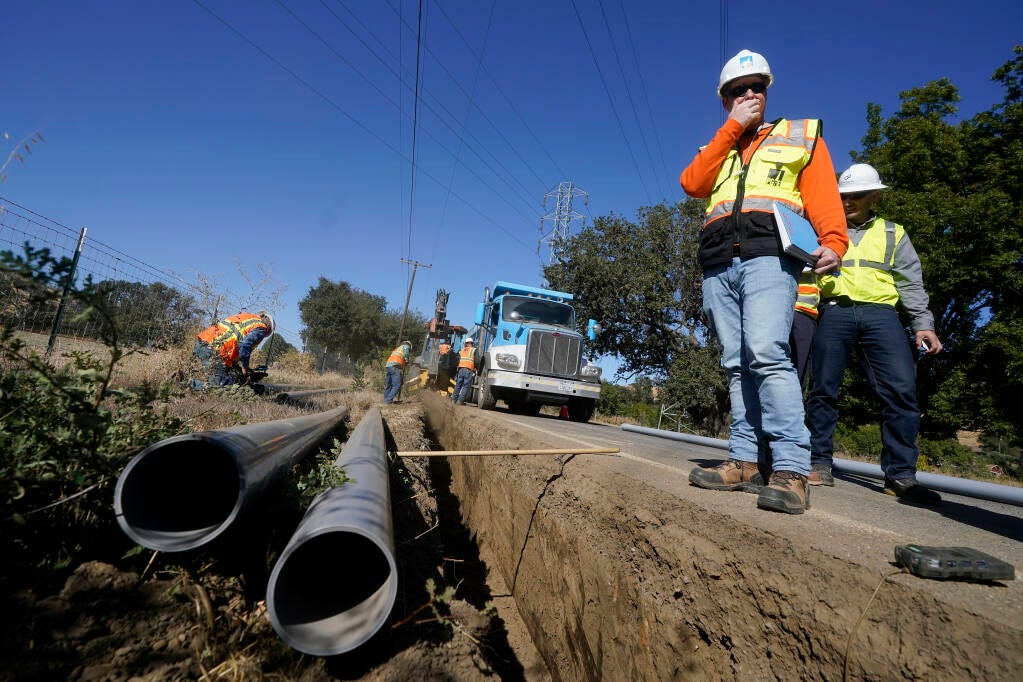Lawmakers target Iran, hurricane relief in special session & abortion may appear on the 2024 ballot
October 27, 2023 — This Week's Top Stories in Florida
Welcome to this week’s edition of Floridian Today, a newsletter about all things Florida — from politics, business, real estate, and climate. Reporting from the Sunshine State, these are the most important stories you need to know. To never miss an update, subscribe here:
Here’s the latest from Florida…
State lawmakers to convene for special session on Iranian sanctions, Hurricane Idalia relief
The Florida state legislature will convene its sixth special session in just three years on November 6, seeking to boost sanctions against Iran in the wake of the Israeli-Hamas war and provide tax relief and financial assistance to Hurricane Idalia victims. Senate President Kathleen Passidomo (R-Naples) and House Speaker Paul Renner (R-Palm Coast) issued a joint proclamation on October 20 to call for the special session, just days after Gov. Ron DeSantis said that lawmakers would gather before the start of the regular session on January 9 to show support for Israel. The legislature is expected to expand upon Florida’s 2008 prohibition on state agencies and local governments from contracting more than $1 million with any business that has contracts with the Iranian government. New measures expected to pass include expanding the list of “scrutinized companies” that do business with Iran and broadening the type of industries subject to the state’s existing sanctions. However, the special session will also tackle impacts stemming from Hurricane Idalia in late August by setting aside additional aid toward recovery efforts, such as financial assistance to the agricultural industry. Florida Chief Financial Officer Jimmy Patronis stated that the session would grant additional funding for the popular My Safe Florida Home program that provides matching grants of up to $10,000 for homeowners to fortify their homes against high winds. The program saw 70,000 homeowners apply for $209 million available in grants after it was relaunched by the legislature last year, aiming to reduce property insurance premiums for Floridians. The special session is scheduled from November 6 through 9.
Floridians may vote on abortion in the 2024 election
A contentious abortion referendum could appear on the 2024 ballot, with a group known as Floridians Protecting Freedom spearheading the initiative. Mona Reis, a longtime advocate for abortion rights, and her colleagues initiated this effort to safeguard abortion access in the state after Roe v. Wade, which legalized abortion, was overturned by the U.S. Supreme Court in June 2022. Since then, abortion access has been threatened by Gov. DeSantis and the Republican-dominated state legislature, which passed a restrictive law in 2022 that banned abortions after 15 weeks of pregnancy, then took it a step further earlier this year by passing a six-week abortion ban. That prohibition is currently pending a court challenge before it takes effect. The abortion rights advocacy group has already garnered support from around 700,000 Floridians and raised approximately $9 million. However, reaching the ballot remains a challenging endeavor, as Florida's requirements for constitutional amendments are among the most rigorous, requiring a series of procedural hurdles to be cleared and a 60% supermajority vote to pass. Even though the group has spent nearly all its raised funds as it works to collect nearly 892,000 valid petitions, the final decision rests with the state Supreme Court, which reviews the amendment's language. Floridians Protecting Freedom also faces fierce opposition from Attorney General Ashley Moody, who has argued that the term “viability” in the proposed amendment’s language has multiple meanings, setting up a guaranteed fight in court. The petition effort reflects the broader national debate on abortion rights, as states across the U.S. grapple with the reversal of longstanding legal precedent surrounding abortion access.
DeSantis’ campaign fundraising totals
Governor Ron DeSantis' presidential campaign and affiliated political committees raised approximately $15 million from July to September, even as the campaign faced declining poll numbers, staff layoffs, and some bad press. The latest figure is less than the approximately $20 million raised by the campaign in the first month and a half of launching and falls short of former President Donald Trump's $24.5 million collected during the same period, excluding political committees. While a respectable haul, the declining totals raise questions about DeSantis' momentum as he hones in on the Iowa caucuses as providing a necessary boost. The campaign spent most of the funds it raised, with major expenses going toward travel and payroll, but expenses in September were less than half of what was spent in July. The campaign had around $13.5 million on hand as October began, with only $5 million available to be used in the primary election due to federal donation limits. However, the pro-DeSantis super PAC Never Back Down has made up for the Republican governor’s dropping fundraising sums and costly expenses. Supporting the campaign’s political operations with massive spending through TV advertisements and voter canvassing, Never Back Down had roughly $97 million available at the end of June, being one of the most well-funded super PACs of the 2024 election cycle. The remaining total is uncertain until the group's updated financial documents are filed in January. Despite DeSantis’ heavy focus and campaign activities concentrated in Iowa, a state his team deems crucial for his success in the GOP primary, he remains reliant on Florida donors, particularly among the politically well-connected around Tallahassee. Individual donations from Iowans to the Florida governor’s presidential candidacy resulted in less than 1% – about $28,000 – raised during the third quarter. Meanwhile, Florida residents contributed about $4.9 million during this same period. DeSantis is also dependent upon billionaires and wealthy donors to back his White House bid as small-dollar donors accounted for just 17% of his total raised. This information is not available in the filings. One notable contributor to DeSantis's campaign is Michael DiNapoli, who donated $6,600 despite being placed on paid leave twice amid allegations of creating a hostile work environment.
Property insurance premiums unlikely to drop, per analysts
Homeowners in Florida may not see a decrease in their insurance premiums soon due to factors such as inflation, the cost of reinsurance, and climate change, according to insurance experts and analysts. Despite efforts by Gov. DeSantis and the Legislature to reform the insurance market over the last year, recent legislation is unlikely to be enough to bring relief for homeowners via a reduction in rates. Lawmakers have focused on stabilizing the state’s insurance market by clamping down on abundant and fraudulent litigation against property insurers, which is believed to be a leading cause behind soaring premiums. At the time, officials projected that the reforms would result in Floridians seeing their rates decline within two years. Since then, regulators have allowed new insurance companies to do business in the state and the trend of insurers declaring insolvency has ceased. However, of all the changes made by legislators in recent years, they have never placed a cap on rate increases – a measure that would go a long way to relieve the frequent double-digit hikes homeowners have been accustomed to. The high cost of repairing and replacing homes also poses a challenge to bringing premiums down as property values steadily climb. According to the Insurance Information Institute, this cost has soared 55% between 2019 and 2022 alone. Similarly, the state's heavy reliance on reinsurance, which has seen a 27% average cost increase this year, is another factor contributing to rising premiums in a hurricane-prone state. The threat of climate change, including more frequent severe hurricanes and increased losses from hail, tornadoes, and wind, is also a significant driver. Florida homeowners already face the highest premiums in the nation and existing pressure on property insurance rates in the state’s unique market further complicates the situation.
Schools implement new safety systems to assess threats
Florida schools are gearing up for a new system designed to enhance threat assessment and safety starting on January 1, 2024. This "Florida model" includes creating threat-management teams for each school and at the district level. These teams will comprise a teacher, an administrator, a law enforcement officer, and a mental health professional. Additionally, the new system mandates that all 67 school districts in Florida use a statewide online system to share information about threat management. Currently, Florida schools rely on the Comprehensive School Threat Assessment Guidelines, a national system. By standardizing the approach and utilizing a shared online system, the state aims to improve the management of threats and enhance school safety. Pinellas County Sheriff Bob Gualtieri, chairperson of the Marjory Stoneman Douglas High School Public Safety Commission, noted the consolidation of online systems would significantly improve information sharing and threat management. This transition has been in progress for a year and is expected to make a substantial difference in boosting safety for students, teachers, and faculty statewide.
Officials push for faster removal of derelict boats
Florida Fish and Wildlife Conservation Commission (FWC) officials are urging for swift action in removing abandoned and storm-damaged boats from coastal waters, citing them as eyesores and environmental threats. They've unveiled a plan to request $7 million in funding from the Legislature for a derelict vessel removal program. The proposal also seeks legislative approval to shorten the notice period for boat owners to deal with damaged and abandoned vessels. Officials believe the problem of abandoned boats is growing due to population influx and aging boats. In the past fiscal year, state agencies removed 353 damaged and abandoned boats following Hurricane Ian, another 282 “abandoned migrant vessels” in South Florida, and another 270 boats throughout the state. Efforts to warn residents to secure their boats ahead of Hurricane Idalia showed progress, with fewer derelict vessels left in the storm's wake as owners tied them down or brought them onshore. In preparation for the 2024 legislative session, the FWC is pushing for changes, allowing quicker action on derelict boats. This would involve posting notification stickers on identified vessels, starting a 21-day countdown for owners to respond by requesting an administrative hearing before the state removes the boat at the owners’ expense. Under current law, the existing process involves mailing notices to owners before placing notification stickers on the boats, which can prove more arduous and requires officers to make two trips to the abandoned vessel once mailed notices are sent. The proposed changes to state law would be a more efficient approach and that will lead to cleaner and safer waters.
Burying Florida’s electrical lines comes at significant cost
In the aftermath of Hurricane Idalia in late August, which caused over half a million Floridians to lose power, President Joe Biden claimed that the outages would have been worse if the federal government had not spent hundreds of millions of dollars to improve the state’s electrical grid by burying power lines. Biden made this claim from the White House in the immediate days following Idalia’s landfall in North Florida, claiming that during the Obama-Biden administration, significant investment was made to replace “wooden power poles with steel poles” and bury electrical lines. However, fact-checking by the Tampa Bay Times and PolitiFact revealed this statement was false. Florida faces threats to its electricity systems from hurricane-induced flooding and high winds, which has led to efforts to reinforce the grid by the state and utilities. This includes using sturdier steel poles for high-voltage transmission lines and bringing the electric distribution systems underground. While burying power lines can be effective in reducing outages during storms, it can cost up to $1 million per mile – a cost that local and state governments often bear and are hesitant to cover. In a list of related grants provided by FEMA to the Tampa Bay Times, none of the grants to Florida were approved during the Obama-Biden administration. In fact, most of the grants – about $38 million -- were approved during then-President Donald Trump's administration, including $8.5 million to the Town of Palm Beach to bury electrical lines. There was also an underground utility project in Coconut Creek that received $500,000 from the Obama administration. Additional grants from the U.S. Department of Housing and Urban Development (HUD), which grants infrastructure hardening funds for hurricane proofing, delivered about $118 million to Florida in 2016, but nearly all that money was prohibited for use by private utilities. That ban is no longer in effect. Meanwhile, the state has sought its own measures to increase the resilience of its electric grid through the passage of SB 796 which was signed by Gov. DeSantis in 2019, allowing utilities to pass along the costs of burying lines and other hardening projects to customers. Both Florida Power & Light and Duke Energy – the two largest electric utility companies in the state – have roughly 45% of their electric transmission system underground. The cost to bury the remaining network of aboveground power lines in Florida could be nearly $100 billion.
Duke Energy seeks approval for Florida customers to cover expenses from Hurricane Idalia
Duke Energy is seeking approval from the Florida Public Service Commission to pass on the costs of Hurricane Idalia, estimated at $91.9 million, to its customers in 2024. The company is also proposing to spread the costs it has already been collecting for storms in recent years, including Hurricane Ian and Hurricane Nicole, to help alleviate the financial burden on customers' monthly bills. If the proposal is approved, Duke would recover $166.1 million in storm-related costs from customers throughout 2024. The Florida Public Service Commission has previously allowed utilities to recover storm-restoration expenses from customers, but no other company had filed proposals to recover Hurricane Idalia costs aside from Duke Energy. Hurricane Idalia, a Category 3 storm, made landfall in the state on August 30, causing extensive damage in some North Florida coastal communities as electric utilities dispatched thousands of line workers, damage assessors, and tree professionals to respond. Duke has approximately 1.9 million customers in Florida, all of whom have been contributing toward the company’s recovery of $431.4 million that was approved for storm-related costs for prior hurricanes and tropical storms.
U.S. Justice Dept. reaches settlement with bank after being accused of redlining in Jacksonville
Atlanta-based Ameris Bank has reached a $9 million settlement with the U.S. Justice Department after being accused of redlining in Jacksonville. The bank is alleged to have avoided underwriting mortgages in Black and Latino communities and discouraging home loans. Ameris Bank has denied violating fair lending laws and says it sought to avoid litigation by agreeing to the settlement, which does not include civil monetary penalties. The settlement is part of the Biden administration's efforts to address redlining through a new dedicated task force. Ameris Bank CEO Palmer Proctor said the bank strongly disagrees with the accusation of discriminatory conduct and cooperated with the investigation to expand access to homeownership in underserved areas. The settlement includes a $7.5 million investment in a loan subsidy fund for majority-minority neighborhoods, $1.5 million for outreach and community partnerships, and the opening of a new branch in the minority-majority neighborhoods of Jacksonville.
Former lawmaker who sponsored “Don’t Say Gay” bill sentenced to federal prison
Former State Representative Joe Harding, a Republican known for sponsoring the controversial "Don't Say Gay" bill in 2022, has been sentenced to four months in federal prison for COVID-19 relief fraud. The 36-year-old one-term lawmaker from Ocala resigned in December and faced charges of fraudulently obtaining over $150,000 from the Small Business Administration's pandemic relief aid loans. He pleaded guilty to wire fraud, money laundering, and making false statements after being indicted by a federal grand jury for securing COVID-19 assistance loans by providing false information to apply and ultimately secure the federal dollars for a dormant business entity. Harding was also sentenced to two years of supervised release following his four-month prison term.
Bad Bunny announces six concerts in Florida
Global rap and singing sensation Bad Bunny has announced his Most Wanted Tour, with six Florida shows scheduled next year. The Latino superstar’s 2024 tour will bring him to Orlando’s Amway Center for two nights, Tampa's Amalie Arena for one night, and three nights at Miami’s Kaseya Center – all taking place in May. Speculation suggests that additional Tampa concert dates may be added later, which marks his first appearance in Tampa for a concert since 2019. Fans eager to attend are encouraged to sign up via Ticketmaster.com to receive a ticket sale code and be registered to gain access to the sale once it is live. Bad Bunny, also known as Benito Antonio Martínez Ocasio, has had a meteoric rise in the music industry, with a string of awards, including three Grammys, four Latin Grammys, and a series of achievements including being the most streamed artist on Spotify in 2022. Those interested can visit registration.ticketmaster.com/badbunny2024 to sign up and learn more.
Tampa family farm grows 1,500-pound pumpkin, the largest in Florida
A sight to be marveled, Tampa is home to a colossal pumpkin weighing in at a staggering 1,500 pounds, making it the largest in Florida. Bearss Groves, a local family farm stand on Lake Magdalene Blvd., has a long history of cultivating enormous gourds, but this year's pumpkin is the most substantial yet. The farm stand has invited the public to come and witness this mammoth pumpkin in person, even allowing free photo opportunities. Barry Lawrance, the owner of Bearss Groves, mentioned that the pumpkin's size is near the limit before deformities occur, and it's the ideal size and shape. The giant pumpkin, obtained after a trip to Michigan, is expected to draw crowds in the coming weeks as the weather cools down. The farm is open from 9 AM to 7 PM seven days a week to allow visitors to snag a photo with the massive pumpkin on display.
Thanks for reading this edition of Floridian Today. To never miss an update, subscribe for free:
In the meantime, if you learned something or found this read interesting, please consider sharing it to grow our community!



